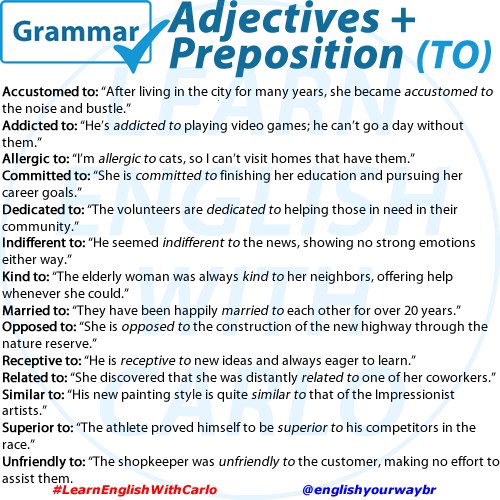Let’s dive into the fascinating world of adjectives paired with prepositions! In English, certain adjectives are commonly followed by specific prepositions to express various relationships, attitudes, and qualities. Understanding these combinations can greatly enhance our language skills and enrich our expressions. Join me as we explore some examples of adjectives paired with prepositions and discover how they bring depth and nuance to our communication.
ADJECTIVE + TO
- Accustomed to: Familiar with something through habit or experience.
For example, “After living in the city for many years, she became accustomed to the noise and bustle.” - Addicted to: Physically or mentally dependent on something, often in a harmful way.
For example, “He’s addicted to playing video games; he can’t go a day without them.” - Allergic to: Having a hypersensitivity or immune reaction to a particular substance.
For example, “I’m allergic to cats, so I can’t visit homes that have them.” - Committed to: Dedicated and loyal to a cause, activity, or person.
For example, “She is committed to finishing her education and pursuing her career goals.” - Dedicated to: Devoted and focused on a particular purpose or goal.
For example, “The volunteers are dedicated to helping those in need in their community.” - Indifferent to: Showing no interest, concern, or sympathy.
For example, “He seemed indifferent to the news, showing no strong emotions either way.” - Kind to: Showing kindness and compassion towards others.
For example, “The elderly woman was always kind to her neighbors, offering help whenever she could.” - Married to: In a legally recognized marriage with someone.
For example, “They have been happily married to each other for over 20 years.” - Opposed to: In conflict or disagreement with something.
For example, “She is opposed to the construction of the new highway through the nature reserve.” - Receptive to: Open and responsive to new ideas, experiences, or suggestions.
For example, “He is receptive to new ideas and always eager to learn.” - Related to: Connected by blood or family ties.
For example, “She discovered that she was distantly related to one of her coworkers.” - Similar to: Resembling or having characteristics in common with something else.
For example, “His new painting style is quite similar to that of the Impressionist artists.” - Superior to: Higher in quality, rank, or importance than something else.
For example, “The athlete proved himself to be superior to his competitors in the race.” - Unfriendly to: Not showing friendliness or warmth towards someone.
For example, “The shopkeeper was unfriendly to the customer, making no effort to assist them.”


1 comment
How do adjectives paired with prepositions in English contribute to the nuances and depth of communication?